Symposium #4 Grand Challenges in Data Science and Engineering in Healthcare: Brain and Neural System
| February 13, 2021 | 10:00 am – 2:30 pm EST |
| Moderator: Paul Sajda and Erika Ross | |
|
|
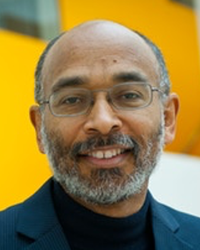
Emery N Brown, MD, Ph.D.
Institute for Medical Engineering & Science Massachusetts Institute of Technology
Emery N. Brown is the Edward Hood Professor of Medical Engineering and Computational Neuroscience at Massachusetts Institute of Technology; the Warren M. Zapol Professor of Anaesthesia at Harvard Medical School; and a practicing anesthesiologist at Massachusetts General Hospital. Dr. Brown received his B.A. (magna cum laude) in Applied Mathematics from Harvard College, his M.A. and his Ph.D. in statistics from Harvard University and his M.D. (magna cum laude) from Harvard Medical School.
Dr. Brown is an anesthesiologist-statistician whose experimental research has made important contributions towards understanding the neuroscience of how anesthetics act in the brain to create the states of general anesthesia. In his statistics research he has developed signal processing algorithms to solve important data analysis challenges in neuroscience. His research has been featured on National Public Radio, in Scientific American, Technology Review, the New York Times and in TEDMED 2014.

Paul Sajda, Ph.D.
Columbia University
Paul Sajda is a Professor of Biomedical Engineering, Electrical Engineering and Radiology (Physics) at Columbia University. He is also a Member of Columbia’s Data Science Institute and an Affiliate of the Zuckerman Institute of Mind, Brain and Behavior. He received a BS in electrical engineering from MIT in 1989 and an MSE and PhD in bioengineering from the University of Pennsylvania, in 1992 and 1994, respectively. Professor Sajda is interested in what happens in our brains when we make a rapid decision and, conversely, what processes and representations in our brains drive our underlying preferences and choices, particularly when we are under time pressure. His work in understanding the basic principles of rapid decision-making in the human brain relies on measuring human subject behavior simultaneously with cognitive and physiological state. Important in his approach is his use of machine learning and data analytics to fuse these measurements for predicting behavior and infer brain responses to stimuli. Professor Sajda applies the basic principles he uncovers to construct real-time brain-computer interfaces that are aimed at improving interactions between humans and machines. He is also applying his methodology to understand how deficits in rapid decision-making may underlie and be diagnostic of many types of psychiatric diseases and mental illnesses. Professor Sajda is a co-founder of several neurotechnology companies and works closely with a range of scientists and engineers, including neuroscientists, psychologists, computer scientists, and clinicians. He is a fellow of the IEEE, AMBIE and AAAS and Chair of the IEEE Brain Initiative. He is also a recent recipient of the DoD’s Vannevar Bush Faculty Fellowship (VBFF).
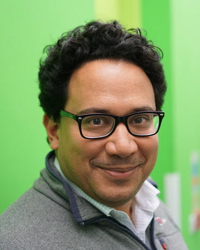
Aldo Faisal, Ph.D.
Imperial College, London
Aldo Faisal (@FaisalLab) is Professor of Artificial Intelligence & Neuroscience at the Dept. of Bioengineering and the Dept. of Computing at Imperial College London, where he leads the Brain & Behaviour Lab [www.faisallab.org] and is the holder of a UKRI Turing AI Fellowship. He is the Director of the £20Mio UKRI Centre for Doctoral Training in AI for Healthcare since 2019 and the Behaviour Analytics Lab at the Data Science Institute (London) since 2017. Aldo works at the interface of Machine Learning, Neuroscience and translational Biomedical engineering to help people in diseases and health. Core to his research discovery and technology innovation work is the idea that both artificial and human intelligence have common roots in the understanding, learning and generation of behaviour. He currently is one of the few engineers world-wide that lead their own clinical trials to validate their technology, His work received a number of prizes and awards, including the $50,000 Research Discovery Prize by the Toyota Foundation.
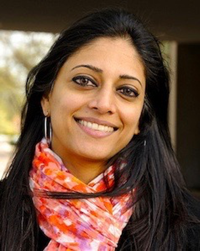
Sridevi V. Sarma, Ph.D.
Johns Hopkins University
Sridevi Sarma received a B.S. in Electrical Engineering from Cornell University in 1994; and an M.S. and Ph.D. in Electrical Engineering and Computer Science from Massachusetts Institute of Technology (MIT) in 1997 and 2006. From 2000-2003 she took a leave to start a data analytics company. From 2006-2009, she was a Postdoctoral Fellow in the Brain and Cognitive Sciences Department at the MIT. She is now an Associate Professor in the Institute for Computational Medicine, Department of Biomedical Engineering, at Johns Hopkins University. Her research includes modeling, estimation and control of neural systems using electrical stimulation. She is cofounder of Neurologic Solutions, Inc. that develops EEG analytics tools for brain disorders. She is a recipient of the the Burroughs Wellcome Fund Careers at the Scientific Interface Award, the Krishna Kumar New Investigator Award from the North American Neuromodulation Society, and a recipient of the Presidential Early Career Award for Scientists and Engineers and the Whiting School of Engineering Robert B. Pond Excellence in Teaching Award.
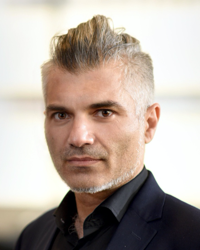
Andreas Savas Tolias, Ph.D.
Baylor College of Medicine, Houston, TX
Dr. Andreas Tolias’ research is focused on understanding how brains give rise to intelligence. His lab combines imaging, electrophysiological, molecular and behavioral methods with machine learning approaches to decipher the neocortical circuit principles of perceptual inference. He obtained his Ph.D. from the Massachusetts Institute of Technology in Systems and Computational Neuroscience and postdoctoral training at the Max-Planck Institute for Biological Cybernetics. He has received numerous awards including the NIH Director’s Pioneer Award, the Beckman Foundation Young Investigator Award, the McNight Foundation Scholar Award and the Michael E. DeBakey Excellence in Research Award. Dr. Tolias is also a co-founder of the Neuroscience-Inspired Networks for Artificial Intelligence organization (ninai.org) and is leading an international team of scientists and engineers working on the interface between brain research and machine intelligence with the goal of engineering less artificial and more intelligent algorithms.
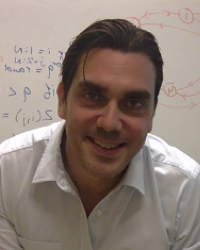
Gabriel A. Silva, M.Sc., Ph.D.
University of California, San Diego
Dr. Gabriel A. Silva is a Professor in the Department of Bioengineering and the Department of Neurosciences at the University of California, San Diego. He holds a Jacobs Family Scholar in Engineering Endowed Chair, is the Founding Director of the Center for Engineered Natural Intelligence, and Associate Director of the Kavli Institute for Brain and Mind. He is an affiliated faculty member in the Department of NanoEngineering, and a faculty member in the BioCircuits Institute, the Neurosciences Graduate Program, Computational Neurobiology Program, and Institute for Neural Computation. Previously, he served as Vice Chair of the Department of Bioengineering, and was Co-Director of the Retinal Engineering Center in the Institute of Engineering in Medicine. Prof. Silva received an Hon.B.Sc. in human physiology and a B.Sc. in biophysics from the University of Toronto, Canada in 1996, followed by an M.Sc. in neuroscience also from the University of Toronto in 1997. He then did his Ph.D. in bioengineering and neurophysiology at the University of Illinois at Chicago, graduating in 2001, followed by a postdoctoral fellowship in the Institute for BioNanotechnology and Medicine (IBNAM) and the Department of Neurology at Northwestern University in Chicago in 2001. He joined the faculty at the University of California, San Diego in 2003.
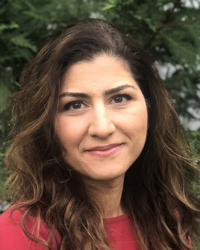
Maryam Shanechi, Ph.D.
University of South Carolina
Maryam M. Shanechi is Assistant Professor and Viterbi Early Career Chair in Electrical and Computer Engineering and a member of the Neuroscience Graduate Program and Department of Biomedical Engineering at the University of Southern California. She received her B.A.Sc. degree in Engineering Science from the University of Toronto, her S.M. and Ph.D. degrees in Electrical Engineering and Computer Science from MIT, and her postdoctoral training in Neural Engineering at Harvard Medical School and UC Berkeley. Her research focuses on developing closed-loop neurotechnology and studying the brain through decoding and control of brain network dynamics. Her lab has developed brain-machine interfaces for restoring lost emotional function in mental disorders and lost motor function in neurological injuries and diseases. She is the recipient of several awards including the NIH Director’s New Innovator Award, NSF CAREER Award, ONR Young Investigator Award, MIT Technology Review’s top 35 Innovators Under 35, Popular Science Brilliant 10, Science News 10 Scientists to Watch, and an ARO Multidisciplinary University Research Initiative (MURI) Award.

Theodoros Zanos, Ph.D.
Zucker School of Medicine at Hofstra/Northwell
Theo Zanos is the head of the Neural and Data Science Lab and an Assistant Professor at the Institute of Bioelectronic Medicine, Feinstein Institutes for Medical Research and the Zucker School of Medicine, Hofstra Northwell. He received his Engineering diploma in Electrical and Computer Engineering from the Aristotle University of Thessaloniki in Greece, his MSc and PhD in Biomedical Engineering from the University of Southern California and postdoctoral training at the Montreal Neurological Institute at McGill. His current research focuses on developing and applying data science and machine learning methods on neural and biological data to enable early diagnosis, disease severity assessment, and personalization and adaptability of therapies. To that end, his lab focuses on understanding how the nervous system senses the state and affects the function of the immune, metabolic and cardiopulmonary systems, as well as combine machine learning methods with multiple healthcare data modalities (Electronic Health Records, continuous vitals, imaging, unstructured notes) to develop and deploy clinical predictive and diagnostic models. His research has been featured in PBS, Scientific American, CNET and other media outlets and he has been awarded the Northwell Excellence in Research Award, the Jean Timmins Award and the Center of Excellence in Commercialization and Research Award.
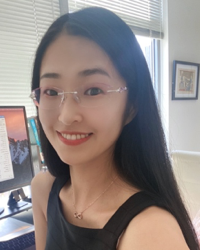
Mengjia Xu, Ph.D.
McGovern Institute for Brain Research, MIT
A new stochastic graph embedding method for Alzheimer’s disease early‐stage prediction and intervention evaluation
Mengjia Xu is currently a postdoctoral associate at McGovern Institute for Brain Research at MIT. Before joining MIT in June 2019, she worked at Massachusetts General Hospital, Harvard Medical School (2018.12 – 2019.6) and Peking University (2017.12-2018.11). She received her PhD degree in Computer Science from Northeastern University of China in December 2017. During her PhD, she worked at Brown University for two years as a visiting PhD student in the Division of Applied Mathematics. Previously, she worked as a full-time research intern at Neusoft Research Institute for two years. Her main research focus is to develop data-driven machine learning methods for multimodality neuroimaging data analysis.